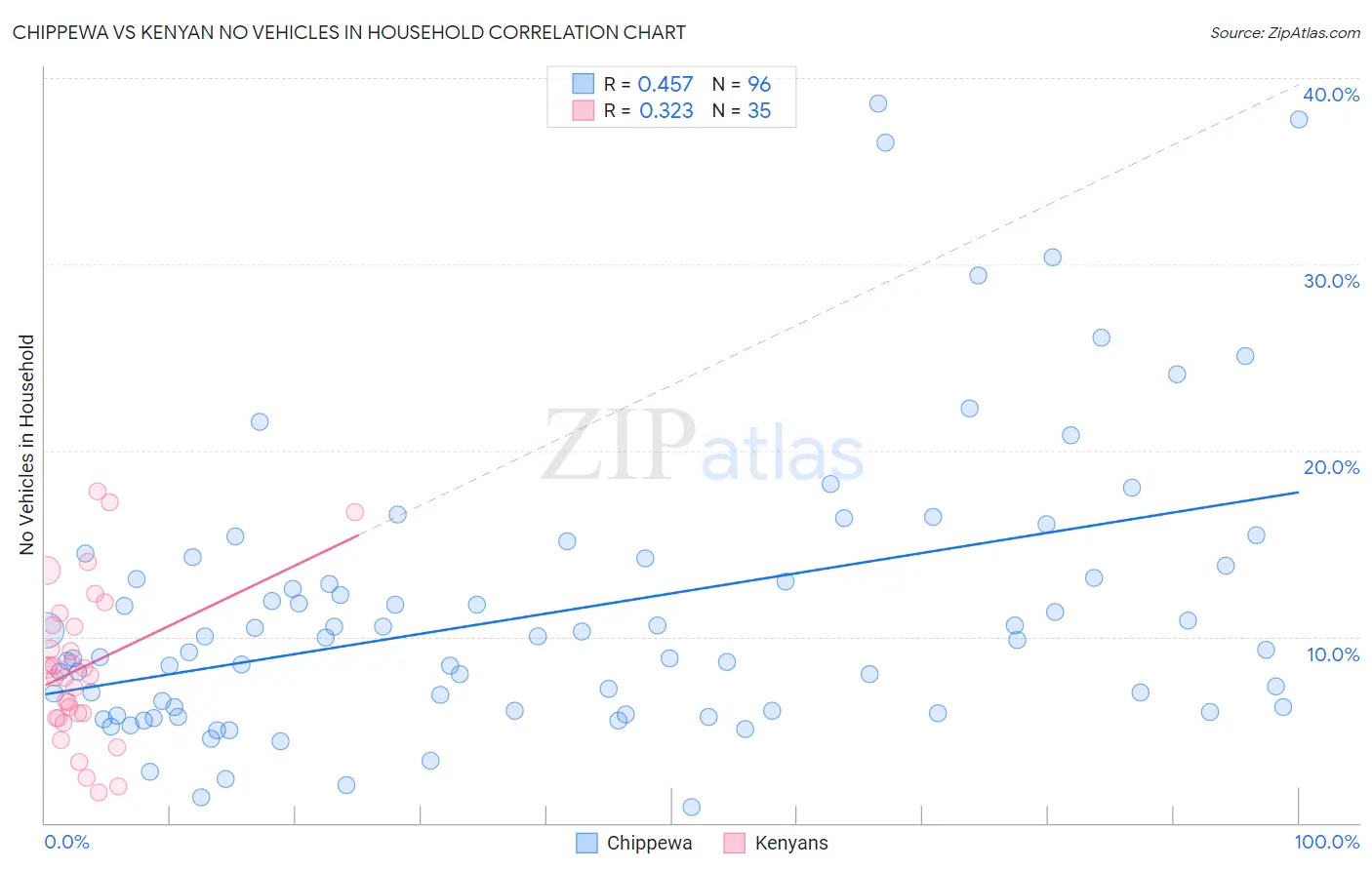Chippewa vs Kenyan No Vehicles in Household
COMPARE
Chippewa
Kenyan
No Vehicles in Household
No Vehicles in Household Comparison
Chippewa
Kenyans
9.4%
NO VEHICLES IN HOUSEHOLD
93.8/ 100
METRIC RATING
117th/ 347
METRIC RANK
9.7%
NO VEHICLES IN HOUSEHOLD
88.0/ 100
METRIC RATING
132nd/ 347
METRIC RANK
Chippewa vs Kenyan No Vehicles in Household Correlation Chart
The statistical analysis conducted on geographies consisting of 214,718,200 people shows a moderate positive correlation between the proportion of Chippewa and percentage of households with no vehicle available in the United States with a correlation coefficient (R) of 0.457 and weighted average of 9.4%. Similarly, the statistical analysis conducted on geographies consisting of 168,125,238 people shows a mild positive correlation between the proportion of Kenyans and percentage of households with no vehicle available in the United States with a correlation coefficient (R) of 0.323 and weighted average of 9.7%, a difference of 2.7%.

No Vehicles in Household Correlation Summary
| Measurement | Chippewa | Kenyan |
| Minimum | 0.88% | 1.6% |
| Maximum | 38.6% | 17.8% |
| Range | 37.7% | 16.2% |
| Mean | 11.3% | 8.4% |
| Median | 9.5% | 7.9% |
| Interquartile 25% (IQ1) | 6.0% | 5.6% |
| Interquartile 75% (IQ3) | 13.5% | 10.6% |
| Interquartile Range (IQR) | 7.5% | 5.0% |
| Standard Deviation (Sample) | 7.6% | 4.1% |
| Standard Deviation (Population) | 7.5% | 4.0% |
Demographics Similar to Chippewa and Kenyans by No Vehicles in Household
In terms of no vehicles in household, the demographic groups most similar to Chippewa are Japanese (9.4%, a difference of 0.17%), Navajo (9.4%, a difference of 0.24%), Serbian (9.4%, a difference of 0.30%), Greek (9.5%, a difference of 0.55%), and Fijian (9.5%, a difference of 0.66%). Similarly, the demographic groups most similar to Kenyans are Immigrants from the Azores (9.7%, a difference of 0.070%), Burmese (9.7%, a difference of 0.28%), Immigrants from Oceania (9.7%, a difference of 0.30%), Syrian (9.7%, a difference of 0.32%), and Nicaraguan (9.7%, a difference of 0.53%).
| Demographics | Rating | Rank | No Vehicles in Household |
| Serbians | 94.3 /100 | #114 | Exceptional 9.4% |
| Navajo | 94.2 /100 | #115 | Exceptional 9.4% |
| Japanese | 94.1 /100 | #116 | Exceptional 9.4% |
| Chippewa | 93.8 /100 | #117 | Exceptional 9.4% |
| Greeks | 92.9 /100 | #118 | Exceptional 9.5% |
| Fijians | 92.7 /100 | #119 | Exceptional 9.5% |
| Immigrants | Thailand | 92.6 /100 | #120 | Exceptional 9.5% |
| Puget Sound Salish | 92.4 /100 | #121 | Exceptional 9.5% |
| Costa Ricans | 92.3 /100 | #122 | Exceptional 9.5% |
| Blackfeet | 91.4 /100 | #123 | Exceptional 9.6% |
| Immigrants | Korea | 90.9 /100 | #124 | Exceptional 9.6% |
| Immigrants | Cameroon | 90.6 /100 | #125 | Exceptional 9.6% |
| Icelanders | 90.2 /100 | #126 | Exceptional 9.6% |
| Immigrants | Kenya | 89.7 /100 | #127 | Excellent 9.6% |
| Immigrants | Syria | 89.5 /100 | #128 | Excellent 9.6% |
| Nicaraguans | 89.5 /100 | #129 | Excellent 9.7% |
| Burmese | 88.8 /100 | #130 | Excellent 9.7% |
| Immigrants | Azores | 88.2 /100 | #131 | Excellent 9.7% |
| Kenyans | 88.0 /100 | #132 | Excellent 9.7% |
| Immigrants | Oceania | 87.1 /100 | #133 | Excellent 9.7% |
| Syrians | 87.1 /100 | #134 | Excellent 9.7% |